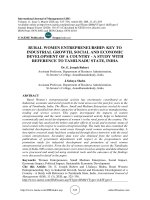Economic growth and economic development 538
Bạn đang xem bản rút gọn của tài liệu. Xem và tải ngay bản đầy đủ của tài liệu tại đây (133.44 KB, 1 trang )
Introduction to Modern Economic Growth
[w (t) , R (t)]∞
t=0 that clear markets. The important feature is that because the knowledge spillovers, as specified in (11.35), are external to the firm, factor prices are given
by (11.36) and (11.37)–that is, they do not price the role of the capital stock in
increasing future productivity.
Since the market rate of return is r (t) = R (t) − δ, it is also constant. The usual
consumer Euler equation (e.g., (11.4) above) then implies that consumption must
grow at the constant rate,
´
1³˜
f (L) − Lf˜0 (L) − δ − ρ .
θ
It is also clear that capital grows exactly at the same rate as consumption, so the
(11.38)
gC∗ =
rate of capital, output and consumption growth are all given by gC∗ as given by
(11.38)–see Exercise 11.15.
Let us assume that
(11.39)
f˜ (L) − Lf˜0 (L) − δ − ρ > 0,
so that there is positive growth, but also that growth is not fast enough to violate
the transversality condition, in particular,
³
´
(11.40)
(1 − θ) f˜ (L) − Lf˜0 (L) − δ < ρ.
Proposition 11.5. Consider the above-described Romer model with physical
capital externalities. Suppose that conditions (11.39) and (11.40) are satisfied.
Then, there exists a unique equilibrium path where starting with any level of capital
stock K (0) > 0, capital, output and consumption grow at the constant rate (11.38).
Proof. Much of this proposition is proved in the preceding discussion. You are
asked to verify the transversality conditions and show that there are no transitional
dynamics in Exercise 11.16.
Ô
Population must be constant in this model because of the scale effect. Since
f˜ (L) − Lf˜0 (L) is always increasing in L (by Assumption 1), a higher population
(labor force) L leads to a higher growth rate. The scale effect refers to this rela-
tionship between population and the equilibrium rate of economic growth. Now if
population is growing, the economy will not admit a steady state and the growth
rate of the economy will increase over time (output reaching infinity in finite time
524









